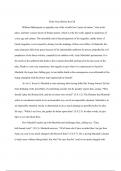Pride Goes Before the Fall
William Shakespeare is arguably one of the world's best “poets of nature,” who in his
plays, laid bare various facets of human nature, which is why his works appeal to audiences of
every age and culture. The miserable end of the protagonists of his tragedies, unlike those of
Greek tragedies, is not caused by destiny, but the makings of their own follies. In Macbeth, the
main character falls from grace because of his indomitable ambition for power, propelled by evil
prophecies of the three witches, coupled by his ruthless wife, Lady Macbeth's persuasions. It is
the result of his ambition that leads to his eventual downfall, portrayed in the last scene of the
play. Death is a one way experience, but tragedy occurs when it is experienced or faced by
Macbeth, the tragic hero falling prey to inevitable death in his consequence as an aftermath of his
being entangled with the power trap engineered by himself.
In Act 5, Scene 8, Macbeth is seen entering after having killed the Young Siward. He has
been thinking of the possibility of committing suicide, but he quickly rejects that, saying, “Why
should I play the Roman fool, and die on mine own sword?” (5.8.1-2). The Romans that Macbeth
refers to considered suicide to be an honorable way out of an impossible situation. Macbeth is in
an impossible situation, but he is determined to do as much damage as possible before he dies.
He says, “While I see lives, the gashes do better upon them” (5.8.2-3). In other words, he just
likes to see the blood flow.
Now Macduff catches up with Macbeth and challenges him, calling out, “Turn,
hell-hound, turn!” (5.8.3). Macbeth answers, “Of all men else I have avoided thee: but get thee
back; my soul is too much charged with blood of thine” (5.8.5-7). He is giving Macduff a chance
to back away without doing battle, but why? He says that his “soul is too much charged with
, Molloy 2
blood of thine.” “Charged” means full, or overburdened, and the “blood” to which Macbeth
refers is the blood that was shed in the slaughter of Macduff's wife and children. In short,
Macbeth is saying that those murders are on his conscience, so he doesn't want to shed Macduff's
blood. Could it be that he really feels remorse? Or is he just making an excuse for backing out of
a fight with Macduff?
Macduff, not impressed, responds that he will let his sword do the talking. They fight,
and it should be an exciting and suspenseful fight. When Macbeth fought Young Siward, he
finished him off quickly, and we saw the boy die in front of our eyes, so we know that a sword
can be as deadly as a bullet. After they have fought for a while, Macbeth seems to think that he
has the advantage, and he boasts, telling Macduff that it would be easier to make a wound upon
the air than to make him bleed. Macduff, Macbeth says, should go fight someone who can be
beaten, but as for himself: “I bear a charmed life, which must not yield to one of woman born”
(5.8.12-13)
Destroying Macbeth's last hope, Macduff replies, “Despair thy charm and let the angel
whom thou still hast served tell thee, Macduff was from his mother's womb untimely ripp'd”
(5.8.16-19). Hearing this, Macbeth curses Macduff, because what he has said has “cow'd my
better part of man” (5.8.18). His “better part of man” is his courage, and he feels it fading. After
this confession of fear–his first in the play–Macbeth curses the fiends who have lied to him and
tells Macduff that he won't fight him.
It's somewhat surprising that Macbeth thinks he has a choice about whether or not to
fight, but Macduff makes it clear that it's not much of a choice. Knowing that Birnam wood has
come to Dunsinane, knowing that Macduff is not of woman born, knowing that he has no




